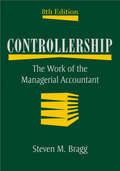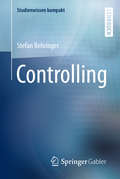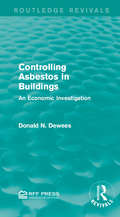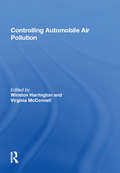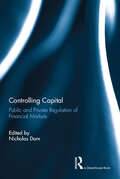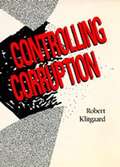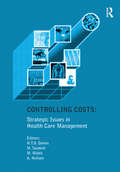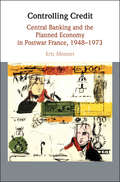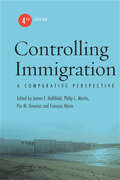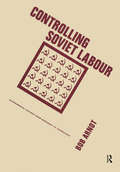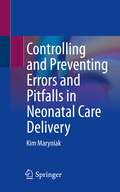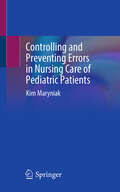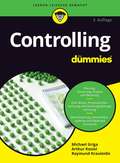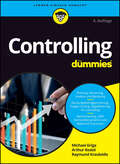- Table View
- List View
Controlled Synthesis of Pt-Ni Bimetallic Catalysts and Study of Their Catalytic Properties (Springer Theses)
by Yuen WuThis thesis focuses on the controlled synthesis of Pt-Ni bimetallic nanoparticles and the study of their catalytic properties. It discusses in detail the nucleation mechanism and the growth process of bimetallic systems, which is vital for a deeper understanding of the design of bimetallic catalysts. The author presents four pioneering studies: (1) syntheses of water-soluble octahedral, truncated octahedral, and cubic Pt-Ni nanocrystals and the study of their structure-activity relationship in model hydrogenation reactions; (2) a strategy for designing a concave Pt-Ni alloy using controllable chemical etching; (3) defect-dominated shape recovery of nanocrystals, which is a new synthesis strategy for trimetallic catalysts; (4) a sophisticated construction of Au islands on Pt−Ni, which is an ideal trimetallic nanoframe catalyst. This thesis inspires researchers working in materials, catalysis as well as other interdisciplinary areas.
Controllership
by Steven M. BraggToday's controllers are no longer seen as technicians who process transactions; they are now seen as business executives with a wide-ranging knowledge of total business operations, best practices, and corporate strategy. Providing a comprehensive overview of the roles and responsibilities of controllers in today's environment, this Eighth Edition of Controllership continues to provide controllers and vice presidents of finance with all aspects of management accounting from the controller's perspective, including internal control, profit planning, cost control, inventory, and financial disclosure.
Controlling & Innovation 2022: Gesundheitswesen (FOM-Edition)
by Thomas Kümpel Thomas Heupel Kay SchlenkrichDieses Buch greift die derzeitigen besonderen Herausforderungen des Gesundheitswesens auf und diskutiert diese sowohl aus wissenschaftlicher als auch aus praxisnaher Perspektive. Die vielfältigen neuen medizinischen sowie technologischen Möglichkeiten erfordern erhebliche finanzielle Ressourcen. Dabei müssen die Akteurinnen und Akteure im Gesundheitswesen drei übergeordnete Zielkategorien beachten, die häufig miteinander konkurrieren: Dies ist erstens die Erbringung medizinischer Leistung nach aktuellem wissenschaftlichen Stand, zweitens die Einhaltung von ökonomischen Zielkriterien sowie schließlich die Abwägung zwischen gesellschaftlicher Wertorientierung und Patientenwünschen.Die zunehmende Komplexität dieses Zielsystems hat zur Folge, dass die wesentlichen Erbringer medizinischer Leistungen zu einem neuen, umfassenderen Controlling-Verständnis kommen müssen, um diese Vielschichtigkeit steuer- und handhabbar zu machen. Dieses Buch richtet sich daher an alle im Gesundheitswesen beschäftigten Mitarbeitenden, an Studierende und Forschende in diesem Sektor sowie an alle interessierten Leserinnen und Leser. Ein besonderer Schwerpunkt liegt auf Aspekten des Controllings des Leistungsprozesses in Krankenhäusern sowie der besseren Gesundheitsförderung durch die Möglichkeiten der Digitalisierung.
Controlling (Studienwissen kompakt)
by Stefan BehringerDieses Lehrbuch aus der Reihe "Studienwissen kompakt" bietet einen Einstieg in die Grundlagen des operativen und strategischen Controllings. Es vermittelt die zentralen Aufgaben und Funktionen, die das Controlling im Unternehmen innehat, und zeigt die Herausforderungen auf, die diese Querschnittsposition mit sich bringt. Zudem werden Trends und Entwicklungen im Controlling thematisiert, die die Arbeit von Controllern in den n#65533;chsten Jahren ma#65533;geblich bestimmen werden. Kurze Lerneinheiten, #65533;bersichtliche didaktische Module sowie die begleitende Lernkontrolle sorgen f#65533;r eine nachhaltige Wissensvermittlung. Das Buch richtet sich damit an alle, die sich mit Fragen des Controllings im Rahmen ihrer Aus- und Weiterbildung (auch im Nebenfach) sowie ihrer beruflichen Praxis auseinandersetzen.
Controlling (Studienwissen kompakt)
by Stefan BehringerDieses Lehrbuch aus der Reihe „Studienwissen kompakt“ bietet einen Einstieg in die Grundlagen des operativen und strategischen Controllings. Es vermittelt die zentralen Aufgaben und Funktionen, die das Controlling im Unternehmen innehat, und zeigt die Herausforderungen auf, die diese Querschnittsposition mit sich bringt. Zudem werden Trends und Entwicklungen im Controlling thematisiert, die die Arbeit von Controllern in den nächsten Jahren maßgeblich bestimmen werden. Neben der deutschen Situation findet insbesondere auch die Schweizer Sichtweise Berücksichtigung.Kurze Lerneinheiten, übersichtliche didaktische Module sowie die begleitende Lernkontrolle sorgen für eine nachhaltige Wissensvermittlung. Das Buch richtet sich damit an alle, die sich mit Fragen des Controllings im Rahmen ihrer Aus- und Weiterbildung (auch im Nebenfach) sowie ihrer beruflichen Praxis auseinandersetzen.In der 2. Auflage wurden alle Kapitel überarbeitet und um aktuelle Entwicklungen wie Nachhaltigkeit und Digitalisierung erweitert. Zusätzliche Fragen per App: Laden Sie die Springer-Nature-Flashcards-App kostenlos herunter und nutzen Sie exklusives Zusatzmaterial, um Ihr Wissen zu prüfen.Der InhaltGrundlagen des ControllingsDie Informationsfunktion des ControllingsDie Steuerungsfunktion des ControllingsDie Kontrollfunktion des ControllingsDigitalisierung und ControllingTrends im Controlling
Controlling Asbestos in Buildings: An Economic Investigation (Routledge Revivals)
by Donald N. DeweesAsbestos dust is well-known for causing cancer and other life-threatening illnesses yet still contaminates countless schools, factories and office buildings. This raises the issue of the best way to deal with Asbestos; immediate removal, containment or removal at renovation or demolition. Originally published in 1986, this report aims to evaluate these methods of dealing with asbestos in relation to their cost-effectiveness to conclude the most appropriate solution. This title will be of interest to students of Environmental Studies and Economics.
Controlling Automobile Air Pollution (The\international Library Of Environmental Economics And Policy Ser.)
by Virginia McConnellThis volume includes many of the most influential and interesting academic articles related to the economics of mobile source pollution control. The papers included explore why vehicles and vehicle markets are unique, provide estimates of the type and magnitude of the social costs of driving and examine estimation methods and estimates of the various elasticities of vehicle demand. Analysis of the social costs and policies to reduce both traditional air pollutants and greenhouse gas emissions are included. Selected articles review the range of evaluation of both regulatory and market-based approaches to controlling emissions. The complexity of the effects of different policies are emphasized and the unintended consequences of regulation are explored in the context of vehicle emissions reduction policies.
Controlling Capital: Public and Private Regulation of Financial Markets
by Nicholas DornControlling Capital examines three pressing issues in financial market regulation: the contested status of public regulation, the emergence of ‘culture’ as a proposed modality of market governance, and the renewed ascendancy of private regulation. In the years immediately following the outbreak of crisis in financial markets, public regulation seemed almost to be attaining a position of command – the robustness and durability of which is explored here in respect of market conduct, European Union capital markets union, and US and EU competition policies. Subsequently there has been a softening of command and a return to public-private co-regulation, positioned within a narrative on culture. The potential and limits of culture as a regulatory resource are unpacked here in respect of occupational and organisational aspects, stakeholder connivance and wider political embeddedness. Lastly the book looks from both appreciative and critical perspectives at private regulation, through financial market associations, arbitration of disputes and, most controversially, market ‘policing’ by hedge funds. Bringing together a distinguished group of international experts, this book will be a key text for all those concerned with issues arising at the intersection of financial markets, law, culture and governance.
Controlling Capital? Legal Restrictions and the Asset Composition of International Financial Flows
by Martin Schindler Mahir Binici Michael HutchisonA report from the International Monetary Fund.
Controlling Contagion: Epidemics and Institutions from the Black Death to Covid (The Princeton Economic History of the Western World)
by Sheilagh OgilvieHow human institutions—markets, states, communities, religions, guilds and families—have helped both to control and to exacerbate epidemics throughout history.How do societies tackle epidemic disease? In Controlling Contagion, Sheilagh Ogilvie answers this question by exploring seven centuries of pandemics, from the Black Death to Covid-19. For most of history, infectious diseases have killed many more people than famine or war, and in 2019 they still caused one death in four. Today, we deal with epidemics more successfully than our ancestors managed plague, smallpox, cholera or influenza. But we use many of the same approaches. Long before scientific medicine, human societies coordinated and innovated in response to biological shocks—sometimes well, sometimes badly.Ogilvie uses historical epidemics to analyse how human societies deal with &“externalities&”—situations where my action creates costs or benefits for others beyond those that I myself incur. Social institutions—markets, states, communities, religions, guilds, and families—help us manage the negative externalities of contagion and the positive externalities of social distancing, sanitation, and immunization. Ogilvie shows how each institution enables us to coordinate, innovate and inspire each other to limit contagion. But each institution also has weaknesses that can make things worse. Markets shut down voluntarily during every epidemic in history—but they also brought people together, spreading contagion. States mandated quarantines, sanitation, and immunization—but they also waged war and censored information, exacerbating epidemics. Religions admonished us to avoid infecting our neighbours—but they also preached against science and medical innovations. What decided the outcome, Ogilvie argues, was a temperate state, an adaptable market, and a strong civil society where a diversity of institutions played to their own strengths and checked each other&’s flaws.
Controlling Corruption
by Robert KlitgaardCorruption is increasingly recognized as a preeminent problem in the developing world. Bribery, extortion, fraud, kickbacks, and collusion have resulted in retarded economies, predator elites, and political instability. In this lively and absorbing book, Robert Klitgaard provides a framework for designing anti-corruption policies, and describes through five case studies how courageous policymakers were able to control corruption.
Controlling Costs: Strategic Issues in Health Care Management
by Huw T.O. Davies Manouche TavakoliControlling costs in health care is rarely something that can be tackled in isolation. Cost control invariably interacts with issues of quality and health care access. Thus, this diverse collection of papers is concerned not just with costs but more importantly with value. Both macro and micro concerns are covered. At the macro level, health care reforms (and especially the ’marketisation’ of health care systems) receive some attention. Papers explore how policy prescriptions get translated and modified during implementation, and assess how these prescriptions impact on both the incentive context and subsequent patterns of service delivery. Resource allocation within bureaucratic health systems continues to pose problems and these too are analysed with new solutions being proposed. At the micro level, a number of contributors wrestle with the difficulties of carrying out the economic evaluation of new drugs and technologies. In each case, the wider theoretical and practical implications of balancing costs and benefits are explored. This collection should prove helpful to health care policy specialists, managers and researchers interested in gaining a feel for the real-world application of cost-focused health services research.
Controlling Credit: Central Banking and the Planned Economy in Postwar France, 1948–1973 (Studies in Macroeconomic History)
by Eric MonnetIt is common wisdom that central banks in the postwar (1945–1970s) period were passive bureaucracies constrained by fixed-exchange rates and inflationist fiscal policies. This view is mostly retrospective and informed by US and UK experiences. This book tells a different story. Eric Monnet shows that the Banque de France was at the heart of the postwar financial system and economic planning, and contributed to economic growth by both stabilizing inflation and fostering direct lending to priority economic activities. Credit was institutionalized as a social and economic objective. Monetary policy and credit controls were conflated. He then broadens his analysis to other European countries and sheds light on the evolution of central banks and credit policy before the Monetary Union. This new understanding has important ramifications for today, since many emerging markets have central bank policies that are similar to Western Europe's in the decades of high growth.
Controlling East-West Trade and Technology Transfer: Power, Politics, and Policies
by Gary K. BertschWestern efforts to control trade and technological relations with communist countries affect many interests and political groups in both Eastern and Western blocs. Although there is general agreement within the Western alliance that government-imposed controls are necessary to prevent material having military importance from falling in the hands of the Soviet Union and its Warsaw Pact allies, there is considerable controversy over the specifics: the exact definition of "militarily significant" material, how the Western nations should administer controls, the implications of glasnost, and other matters.
Controlling Immigration: A Comparative Perspective, Fourth Edition
by James F. Hollifield, Philip L. Martin, Pia M. Orrenius, and François HéranThe fourth edition of this classic work provides a systematic, comparative assessment of the efforts of major immigrant-receiving countries and the European Union to manage migration, paying particular attention to the dilemmas of immigration control and immigrant integration. Retaining its comprehensive coverage of nations built by immigrants—the so-called settler societies of the United States, Canada, Australia and New Zealand— the new edition explores how former imperial powers—France, Britain and the Netherlands—struggle to cope with the legacies of colonialism, how social democracies like Germany and the Scandinavian countries balance the costs and benefits of migration while maintaining strong welfare states, and how more recent countries of immigration in Southern Europe—Italy, Spain, and Greece—cope with new found diversity and the pressures of border control in a highly integrated European Union. The fourth edition offers up-to-date analysis of the comparative politics of immigration and citizenship, the rise of reactive populism and a new nativism, and the challenge of managing migration and mobility in an age of pandemic, exploring how countries cope with a surge in asylum seeking and the struggle to integrate large and culturally diverse foreign populations.
Controlling Pollution
by John Norregaard Valrie Reppelin-HillA report from the International Monetary Fund.
Controlling Soviet Labour: Experimental Change From Brezhnev To Gorbachev
by ArnotWith a growing population, deteriorating economic conditions, and an unstable imperial centre, Soviet Central Asia would seem destined to become a trouble spot. Instead Islamic traditionalism has survived and flourished in Central Asia. This book looks at the reasons why.
Controlling als Treiber der Energieeffizienz: Integration von Energiemanagement in vorhandene Controllingstrukturen
by Nathanael HarfstIn der vorliegenden Dissertation analysiert Nathanael Harfst die Rolle struktureller und organisatorischer Treiber der Energieeffizienz in Unternehmen mit zertifiziertem EnMS nach ISO 50001. Besonderes Augenmerk liegt dabei auf der Nutzung vorhandener Controlling-Strukturen zur Steuerung des Energieeinsatzes im Rahmen des betrieblichen Energiemanagements. Mit Hilfe der varianzbasierten Strukturgleichungsmodellierung (PLS) werden die aufgeworfenen Hypothesen empirisch getestet. Die Ergebnisse stützen die Annahme, dass eine Integration von energiebezogenen Steuerungsaspekten in vorhandene Strukturen und Prozesse des Controllings deutlich zur Steigerung der Qualität des Energiecontrollings beiträgt und in der Folge einen signifikanten Beitrag zur Erhöhung der energiebezogenen Leistung von Unternehmen leisten kann.
Controlling and Preventing Errors and Pitfalls in Neonatal Care Delivery
by Kim MaryniakThe aim of this book is to inform nurses about the most common and the more serious errors made in caring for neonatal patients. Nurses play the largest role in patient care and their overwhelming workload may sometimes lead to errors that are, in some cases, irreversible or even fatal, putting a great deal of responsibility on nurses to avoid errors. And amongst patients that nurses care for, the most vulnerable of these are neonates. This book covers learnings about the uniqueness of neonatal patients and common conditions that are seen with patients in the neonatal intensive care unit (NICU). Factors that are predisposing and contributing factors for nursing errors are reviewed. The types of errors, consequences, detection, and monitoring for nursing errors are included. The book describes how errors can be avoided with necessary precautions, and managed appropriately based on current evidence-based practice. Recommendations for further study are also provided. This resource can be a useful tool for professional nurses, as well as nurse educators, leaders, and mentors to educate and guide their students and novice nurses.
Controlling and Preventing Errors in Nursing Care of Pediatric Patients
by Kim MaryniakThis book offers nurses guidance about the most common and the more serious errors made in caring for pediatric patients, from infants to adolescents (ages 0-18 years), and how they can be avoided. Nurses play the largest role in patient care, and their overwhelming workload may sometimes lead to errors that are, in some cases, irreversible, putting a great deal of responsibility on nurses. This book is unique in identifying risk, potential, and actual errors, determining root causes, and identifying best practices.This book covers learning specific to pediatric patients, such as their frailty or their inability to communicate. It also reviews the predisposing and contributing factors (staff shortage, work overload, fatigue) and describes the types of errors, including omission, medication errors (prescribing, dosing), identification errors, and procedural errors to name a few. Consequences, detection, and monitoring for nursing errors are also included.The book describeshow errors can be avoided by taking the appropriate measures and how they can be adequately managed according to current evidence-based practice. Recommendations for further study are also provided.This is a valuable resource for professional nurses, as well as nurse educators, leaders, and mentors to train and guide their students and novice nurses.
Controlling für Dummies (Für Dummies)
by Michael Griga Raymund Krauleidis Arthur Johann KosiolController haben für Nichtcontroller das Image vom bösen Überwacher, Erbsenzähler und Geizkragen. Dieses Buch zeigt, dass das Controlling gar nicht so geheimnisvoll ist, wie es manche Controller gerne erscheinen lassen. Anhand vieler anschaulicher Beispiele erklären die Autoren die unterschiedlichen Formen des Controllings und dessen Aufgabenbereiche. Sie erfahren, was es mit Gewinn-und-Verlust-Rechnung, Deckungsbeitragsrechnung und Bilanzen auf sich hat, wozu Kennzahlen gut sind und welche unterschiedlichen Spielarten des Controllings es gibt. Ein angenehm lesbares Buch für alle, die sich beruflich mit dem Controlling beschäftigen müssen oder einfach ihren Controller besser verstehen möchten.
Controlling für Dummies (Für Dummies)
by Michael Griga Raymund Krauleidis Arthur Johann KosiolAlles unter Kontrolle Controller haben oftmals das Image vom bösen Überwacher und Geizkragen. Dieses Buch zeigt, dass Controlling sehr vielseitig und für Unternehmen enorm wichtig ist ist. Anhand anschaulicher Beispiele erklären die Autoren die unterschiedlichen Formen des Controllings und dessen Aufgabenbereiche. Sie erfahren, was es mit Gewinn-und-Verlust-Rechnung, Deckungsbeitragsrechnung und Predictive Forecast auf sich hat und wozu Benchmarking, Kennzahlen und Target Costing gut sind. Ein gelungenes Buch für alle, die sich beruflich mit dem Controlling beschäftigen müssen oder einfach ihren Controller besser verstehen möchten. Sie erfahren Warum gute Planung und Kontrolle im Unternehmen so wichtig sind Welche Werkzeuge Controller einsetzen Welche Rolle Bilanzen und Berichte im Controlling spielen Wie Sie die Digitalisierung im Controlling umsetzen
Controlling im Betrieblichen Gesundheitsmanagement: Das 7-Schritte-Modell
by Holger Pfaff Sabrina ZeikeDas Betriebliche Gesundheitsmanagement wird zunehmend komplexer und damit schwieriger zu steuern. Dieses Buch unterstützt die Verantwortlichen bei der professionellen Bewältigung dieser Steuerungsaufgabe. Es führt in das umfangreiche Thema des Controllings im Betrieblichen Gesundheitsmanagement ein, erläutert die Grundbegriffe und liefert einen Orientierungsrahmen für die professionelle Planung wirkungsvoller Gesundheitsmaßnahmen. Im Mittelpunkt steht das 7-Schritte-Modell des Controllings – ein Tool zur Strukturierung von Kennzahlen für einen zielgerichteten und wirksamen Einsatz, das sich flexibel an die Unternehmensstrategie anpasst und den Anforderungen an ein modernes und agiles Controlling gerecht wird. Ein Muss zum Aufbau und zur Erhaltung eines nachhaltigen Betrieblichen Gesundheitsmanagements!
Controlling im Gesundheitswesen: Transparenz für Entscheidungen mit Fällen aus der Praxis
by Dagmar AckermannDieses Buch präsentiert eine Vielfalt aus der Realität abgeleiteter Situationen sowohl aus Krankenhäusern und Pflegeeinrichtungen als auch bei niedergelassenen Ärzten, in Apotheken und Krankenversicherungen. Vor dem Hintergrund der Finanzierung von Gesundheitsleistungen spiegeln die Fallbeispiele typische Herausforderungen wider, mit denen sich die jeweiligen Akteure auseinandersetzten müssen. Die Bandbreite der Themen reicht von operativen bis hin zu strategischen Controlling-Aufgaben. Das Werk geht dabei auf die Herausforderungen für das Leistungs-, Qualitäts-, Personal- und Finanzcontrolling ein und thematisiert die Bedeutung des Investitionscontrollings. Ergänzt werden die Fallstudien durch Teaching Notes, die anzustrebende Lernziele formulieren. Hinzukommen strukturierte Fragen, die beim Selbststudium eine fundierte Bearbeitung der Fälle ermöglichen und es werden Hinweise zur Vertiefung der für die Fälle zentralen Themen gegeben. Im Anhang sind für jeden Fall Kennzahlen zu finden, die in der Praxis des Managements für Gesundheitseinrichtungen genutzt werden.
Controlling im Handel: Innovative Ansätze und Praxisbeispiele
by Michael Buttkus Altfrid Neugebauer Anna KalandDie Neuauflage dieses Werkes hat nicht nur umfangreiche Aktualisierungen erfahren. Vielmehr erlebt es durch zwei neue Beitr#65533;ge eine wertvolle und interessante Erweiterung. Im zweiten Teil des Buches zum Thema Steuerungsmodelle wird durch einen neuen Beitrag der zunehmenden Bedeutung der Digitalisierung Rechnung getragen. Klassische Gesch#65533;ftsmodelle sind im Wandel, mit ihnen ver#65533;ndern sich die Anforderungen an die Unternehmenssteuerung und stellen Unternehmer vor neue Herausforderungen. Der Beitrag zum ,,Controlling von Multichannel Gesch#65533;ftsmodellen" greift diese Herausforderungen auf und entwickelt L#65533;sungskonzepte f#65533;r das Controlling von Gesch#65533;ftsmodellen, welche einer Multichannel Strategie folgen.

